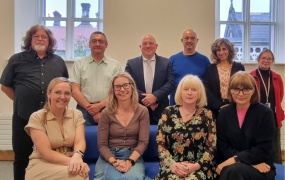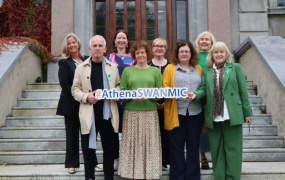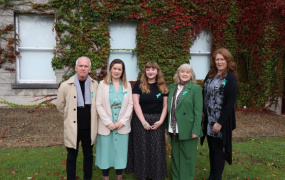Outreach, Engagement & Community Initiatives
City Connects National Centre
Based on the positive, collaborative working relationships between Boston College and MIC, and the commitment to expand City Connects beyond the North-East Inner City (NEIC) in Dublin, BC identified the need to establish a centre in Ireland. The proposed National Centre for City Connects Ireland (NCCCI) was to be located within the CDU in MIC, which played a strategic role in the development of City Connects in Ireland to date.
The Department of Education approved funding of €148,771 per annum for a permanent post in the CDU for a National Lead Implementation Manager for the City Connects Project in MIC. The CDU submitted an application to the DE for further funding of €432,573 to staff and resource the NCCCI in MIC permanently.
A City Connects Showcase was held in the NEIC Primary Schools, Dublin, on 17 October to celebrate the visit of Dean Stanton Wortham of Boston College. Representatives from the Department of Education, which funds the City Connects Pilot Project in the NEIC, MIC, TUSLA, the Department of An Taoiseach, NEIC Principals, pupils, parents, coordinators and key stakeholders attended the showcase to celebrate the positive impact of City Connects in the NEIC.
Boston College and MIC submitted an application to the DE for €13,230 to part-fund a Professional Learning Visit to BC in March 2024 for the 10 Principals in the NEIC. This visit provided the principals with an opportunity to deepen and solidify their expertise through engaging in peerlearning with principals in Boston who had been engaged in the long-established implementation of City Connects in the U.S. BC sourced a funding donation to cover half of the travel and subsistence costs for the principals for this visit.
In addition to overseeing the implementation of City Connects in Ireland, MIC also engaged in research and evaluation for City Connects. Dr Ruth Bourke led a Rapid Independent Evaluation of the City Connects Pilot in the NEIC 2020-2023. Prof. Emer Ring provided advisory support for this evaluation, which was submitted to the Department of Education and Skills on 31 October.
In the spring of 2024, the Child Poverty and Well-Being Programme Office was established within the Department of the Taoiseach. Six priority areas were identified, with education featuring prominently. On 1 August, the Taoiseach launched From Poverty to Potential: a Programme Plan for Child Poverty and Well-Being 2023-2025. The role of the Programme Office was to coordinate and support inter-departmental and cross-sectoral initiatives to tackle childhood poverty and to promote childhood well-being. In discussions with the Department of Education, it was signalled that two MIC initiatives, City Connects and the Professional Doctorate in Educational and Child Psychology (DECPsy) programme, fell directly within the strategic ambit of the Plan and were being supported on that basis.
MIC was very pleased to welcome Minister for Education, Norma Foley TD, to campus on 30 May to launch the National Centre for City Connects Ireland (NCCCI)—a ground-breaking school-based system of intervention pioneered in Boston, which has incredible potential to make a difference across Ireland.
The event was attended by close to 100 attendees, which included officials from the Department of Education, Tusla, NEIC principals, City Connects Ireland Coordinators, educators and MIC staff.
The guest of honour was the Executive Director of City Connects at Boston College, Prof. Mary Walsh, and she was joined by her colleagues, Dr Claire Foley and Tina Chen-Xu. The event was live-streamed for the audience across the water.
Following a wonderful speech by Prof. Walsh, Minister Foley spoke at length, praising the importance of innovative and inclusive initiatives such as City Connects, and made special mention of the contribution made by the Irish diaspora.
City Connects was designed, developed and delivered in partnership with schools and services and was originally established at the Mary E. Walsh Centre for Thriving Children in Boston College. In close collaboration with Boston College, and in the first international expansion of the programme, MIC was the lead implementation partner for City Connects in Ireland.
Thanks to a successful pilot scheme, running since 2020 in 10 DEIS Band 1 primary schools in the North East Inner City (NEIC) in Dublin, almost €600,000 in Department of Education funding was allocated to the NCCCI to further develop and expand the programme. This brought to €1.8m the total DE investment in City Connects in Ireland.
Community Engagement and Public Service
MIC and Limerick's Directly Elected Mayor
Following negotiations with RTÉ, it was agreed that the Upfront programme with Katie Hannon would be televised live from the College on May 28, featuring a debate involving all 15 candidates in the contest to become the first directly elected Mayor of Limerick.
200 people attended the debate, which marked the first televised debate of the Limerick Directly Elected Mayor campaign and the first ever outside broadcast of the Upfront programme. The debate was split into two panels with topics including the powers of the new office, housing, transport, healthcare, and the rural/urban divide. There was plenty of lively discussion and interactions.
Diocese of Limerick Interagency Safeguarding Conference
Creating a 'community of practice' and demystifying the processes around safeguarding to create a safer world was the focus of a Diocese of Limerick Interagency Safeguarding Conference held at MIC on 16 May.
The event, entitled 'Working Together to Protect Children and Adults Who May be Vulnerable', saw representatives from Tusla, the HSE, and An Garda Síochána make presentations to around 60 attendees, including staff from relevant agencies, members of religious communities, and lay people.
Bishop of Limerick, Brendan Leahy, emphasised that the occasion was an opportunity to "recognise again the extensive safeguarding protocols and procedures which are led by many committed people across the country" as well as stay informed about the "very significant developments in the policies and practices of the statutory agencies".







